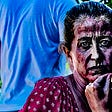Crucibles for Change
Our pandemic-induced reflections on time, distance, and health have been interrupted in the past few months by questions of another orientation. Rather than ask ourselves how best to return to normalcy, and what that normalcy should look like, we are asking ourselves now how best to stand in solidarity with others whose realities bear no semblance to any normalcy we are prepared to accept. The cards are on the table. At issue is not what they show, but what we might do with the hands we are dealt.
There was another time, in August of 1979, when windows looked out upon a tragedy. In Morbi, Gujarat, it wasn’t flames, but water, the rolling, solid kind that reminds you of its cosmic proportions. Until the casualties from the 1975 Banquiao Dam failure were declassified, the Machchhu Dam floods in Morbi held the record for the worst dam failure in world history with an estimated 25,000 casualties. Imagine for a moment looking out a window that is obstructed by a sheet of dark, muddy water. Indiscernible shadows pass by the window. When the water recedes, military forces are called into Morbi for relief work. The shadows come into focus as innumerable bodies, facedown and strewn across the mud, cattle strung up by their necks in telephone wires or slumped by the roadsides. In the aftermath of the flood, which has managed to sweep the entirety of the village into incarnate desolation, there is no drinking water, no efficient means of transportation out of the area, and scarcely a beating heart. To this day, my mom tells me, there are survivors who cannot look a running showerhead straight on.
When news of the disaster reached His Holiness Pramukh Swami Maharaj, he made an announcement over the radio, asking young volunteers to band together and to travel to Morbi immediately if they were able. The effect of a single request made by a guru to his or her disciples was evident in the way that hundreds of volunteers arrived in Morbi nearly overnight. Among the various pressing needs of the town’s few survivors included a safe, clean source of drinking water. The volunteers got to work immediately. But Pramukh Swami instructed them to arrange for chai in addition to water, recognizing that as vital as the residents’ need for water was a need for comfort, for a small hope that their upturned lives could slowly return to normal. The volunteers — hundreds of men, women, and swamis — recall that among the thousands of full meals and cups of water that they served to Morbi residents, it was the 25,000 cups of hot chai that they served for thirteen consecutive days that infused people with the courage to continue.
Another pressing need was the proper disposal of the thousands of cadavers. Swiftness was of utmost importance, lest the town be doubly crippled by a bout of disease. The bodies were swollen with water. The stench was compounded by a ubiquitous wetness in the area. Young volunteers pulled body after body from the mud, holding their noses and sometimes succumbing to queasy stomachs as they worked. Because of the sludge, the volunteers had given up wearing shoes, which only disappeared into the quagmire. But this left them vulnerable to metal and glass debris that lay beneath the mud surface. They began developing infections from their injuries. At this point, volunteers from other organizations began to evacuate Morbi, fearing the risks to their own health if they continued the relief efforts. The BAPS volunteers also began to feel demotivated, daunted by the necessary task and yet at a loss for how it could be physically safe for them to accomplish it. Pramukh Swami gave them two pieces of advice. First, they should wrap their feet tightly in thick cloth to avoid injury. Second, they should work not to properly dispose of the bodies as health hazards but to honorably give them ritual passage, as if each corpse was a deceased family member. The volunteers began to perform thousands of ritual cremations, learning to forge in every kindled fire a commitment to the human family.
In just a few days, Pramukh Swami himself arrived in Morbi. The brigadier general heading the military relief work gave him a short tour of the various ongoing restoration efforts. Dissatisfied with seeing the efforts at a distance, Pramukh Swami came out of the jeep, stepping through mud and debris and talking to people, meeting with volunteers and blessing them, taking up each task he encountered. There is a photo of the relief efforts that shows Pramukh Swami pouring chai from a kettle into cups at a table, while people crowd around him. The angle of his arm mirrors that of the person who pours tea beside him. The photo encapsulates a moment, I think, in which it is clear that Pramukh Swami never considered himself a savior descending from on high to pity common people. Pramukh Swami wasn’t an unaffected splash of orange among shades of brown and gray, as it might appear in a color photo. Here, in the sepia photo, Pramukh Swami lovingly gazes into the eyes of the person for whom he pours tea, not simply existing among people but thoroughly belonging to them. His expression is shared by many of those photographed. Nobody would have guessed, upon a glimpse at that countenance, that on the day Pramukh Swami visited Morbi and joined in plowing the streets and pouring tea, he was battling a high fever.
The swamis and volunteers stayed in Morbi for a total of 50 days. They plowed through 17 streets and cleaned over 1,300 buildings, including factories, hospitals, college buildings, banks, shops, temples, mosques, and cow sheds. They provided vaccines, distributed clothes, and relocated people to shelters in Rajkot. On August 25th, 1979, local Muslims celebrated Eid. There was still no surplus of food, so at Pramukh Swami’s urging, the swamis prepared sweet and savory dishes for upwards of 5,000 celebrating Muslims. The entire community celebrated Eid together.
There are many ways in which what happened in Morbi cannot be superimposed upon what is happening now. After all, the floods in Morbi can only be described as an act of God, while war is strategized and carried out by humans and their imperfections. But as I watch footage from the relief efforts some 41 years later, I am struck by how a single fact cuts through the confusions and the challenges that the volunteers faced in Morbi: Pramukh Swami’s unwavering commitment to the fact that where one sees suffering, one stands by it and makes it one’s own, regardless of how difficult it is. Where there is pain, there is an opportunity to soothe. Where there is sadness, there is an opportunity to love. Where there is need, there is an opportunity to give. Where there is injustice, there is an opportunity to act. And, if, like Pramukh Swami, one’s commitment to humanity is refracted through the lens of singular service to God, these are not only opportunities, but duties. They are acts of devotion to which every ounce of effort is not a favor or a means to an end, but an end in itself, a crucible wherein one’s own character and devotion are fashioned. From this perspective, the relief work in Morbi was not an economic system that was optimized along axes of effort and output. The statistics are inspiring, but they cannot encompass the story. Neither was the relief work merely a task list, or a fundraiser, or a care package. In Morbi, volunteers learned from Pramukh Swami to discard the self and its entitlements in favor of a higher Self and higher ideals, embodying humility and compassion at once.
What ought we to do, now that tragedies of a distinctive variety unfold outside the global window? The lesson is, of course, that suffering should not be ignored. But such a platitude is only a reminder of that which many of us know to be true already. Equally salient in the example that Pramukh Swami sets, I think, is allowing the fact of suffering to look you in the eyes and demand action. Suffering does not merely call for attention from the ambiguous masses; it requires your attention. It requires that you descend from the jeep and muddy your bare feet. It requires you to find out where there are needs and ask yourself how you can fulfill them. The landscape of catastrophes is unfortunately so vast that there is always, always space to carve out a personal niche for action. And, most of all, we must do so humbly, without entitlements or expectations for reward.
It all seems very complicated and impossible, but Pramukh Swami’s successor, His Holiness Mahant Swami Maharaj, offers a helpful starting point. He asks us to see only the best in people. I think he points out that refraining from making negative or hurtful comments — and correcting those who do — is service. Listening with an open mind and admitting when you are wrong is service. Saying a prayer for those who suffer as a way of saying, “This, too, is relevant to me,” is service. Giving what one can — not necessarily of money, but of spirit and civic duty — is service. Allowing these actions to spill over across our arbitrary compartmentalizations between that which is “religious” and “personal” and instead thread through all of life makes change not only possible — as it was in Morbi — but ultimately indispensable.
Pranati Parikh







